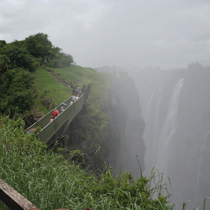 |
 |
||||||||||||||
| features columns jumbolaya planet tufts newswire wedding albumDepartments The Issue Letters Bookshelf Postings |
 |
| Victoria Falls. Photo: Jeffrey Lazar |
Postings
Dr. Chotanga
In Livingstone, Zambia, a young physician is torn by human extremesThe Zambian name for Victoria Falls is Mosi Oa Tunya, which means “smoke does sound there,” in reference to the perpetual clouds of mist generated by the thundering falls. I see these clouds on my downhill walks home from Livingstone General Hospital, where for seven weeks I am working on a Johnson & Johnson Physician Scholar Fellowship, on leave from my third year of residency in emergency medicine at Yale-New Haven Hospital.
Home is Jollyboys Backpackers, a hostel run by some British expats and local staff. My room is tiny, with just enough space for a bed, a nightstand, and a small wicker shelf.
Only a few trained doctors work at Livingstone General, so my arrival has significantly bolstered the staff. The place looks miserably worn down. There is minimal lighting, and on cloudy days, the hospital is almost forbiddingly dark inside. I soon learn that printed forms don’t exist here. If I need a lab request form, the nurse carefully folds and tears a piece of paper into quarters. Then, at the top of the paper, she writes, “LAB REQUEST FORM” and adds the lines for name, age, etc.
The primary pediatric ward consists of a large, cafeteria-sized room with about 40 beds, most of which are filled by children less than three years old. Their maladies include malaria, gastroenteritis, severe malnutrition, pneumonia, and HIV. The ward is stuffy and dimly lit. The mothers, and occasionally fathers, hover at their children’s bedsides, brushing away the persistent flies.
The pediatric service has been averaging two deaths per day. Profound emaciation, lethargy, and elevated respiratory rates all signal what is referred to here as “collapse.”
The contrast between the hospital, where a child’s death is hastened by the lack of a one-dollar piece of plastic tubing, and the hostel, where one might sign up for a two-hundred-dollar helicopter tour of Victoria Falls, troubles me. A few days ago, after passing storms had cooled the night, I found myself floating on my back in a warm water pool under a starry African sky with a full stomach and a satisfied heart. The next day, I would attend in the pediatric ward, where our failings as a species could not be more in evidence, and my capacity to find any satisfaction with my existence will be sorely tested.
One morning I see a 78-year-old man whom I diagnose with a heel fracture and admit to orthopedic surgery. He is the oldest patient I have seen here, and then it dawns on me that perhaps the biggest difference between Livingstone General Hospital and most American hospitals is the lack of elderly patients. Last week I learned that the average life expectancy in Zambia is 37. I’m not seeing elderly patients because Zambians simply don’t live that long; Zambia’s senior citizens are 40 years old.
My last patient of the afternoon is a healthy-looking teenager who presents with a swollen finger sustained while playing basketball. The swelling is complicated by the presence of a ring. The rate at which the swelling is increasing suggests that if the ring is not removed shortly, his situation will become more critical.
A hospital that does not have Band-Aids does not have a ring cutter. As I am brainstorming how we can remove the ring from the finger, I recall seeing workers cutting rebar at a nearby construction site. I excuse myself to the nurses, walk my patient to the construction site, and explain our plight to the workers. One of them steps forward with a hacksaw, and as I stabilize the finger and prevent secondary injury, he delicately saws the ring off. The operation is successful, and the workers and I shake hands.
During an outpatient shift, the nurse on duty decides to bestow upon me a Zambian name. When I ask her what my new name means, she tells me that it is just a common name. I suggest it would be fun to have a name that means something. After a pause, she tells me my name will be “Dr. Chotanga.” When I ask what it means, she tells me “gift.” I could hardly imagine a finer compliment.
Since his stint in Zambia, JEFFREY LAZAR, M.D./M.P.H. ’03, has returned to Yale New Haven Hospital, where he currently serves as chief resident in emergency medicine. He looks forward to returning to Africa in the near future.